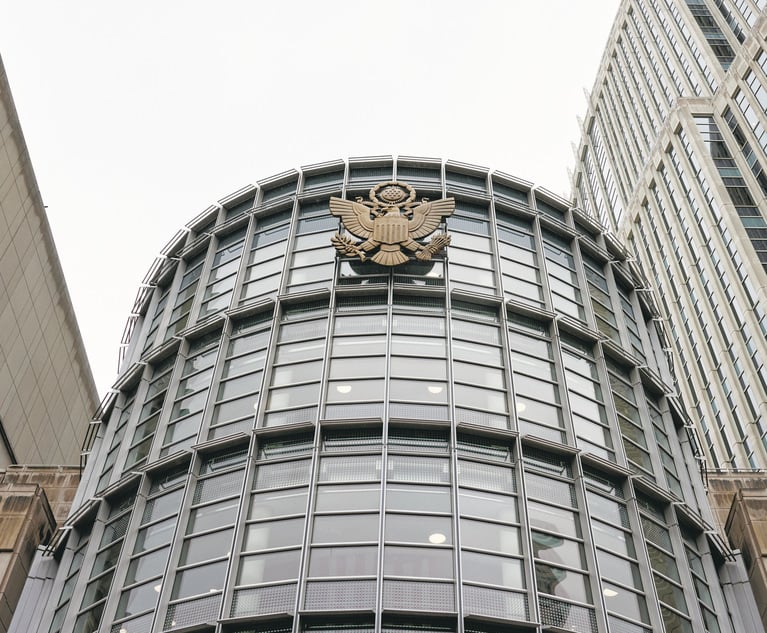Temporary Suspension of Personal Guaranties in Commercial Leases
In their Landlord Tenant column, Warren Estis and Alexander Lycoyannis discuss a new law added to the New York City Administrative Code which purports to temporarily suspend personal guaranty provisions contained in commercial leases.
June 02, 2020 at 12:13 PM
7 minute read
 Warren Estis, left, and Alexander Lycoyannis. Courtesy photos
Warren Estis, left, and Alexander Lycoyannis. Courtesy photos
The COVID-19 pandemic has elicited vigorous legislative responses at the federal, state and local levels. Among this legislation is a New York City law enacted on May 26, 2020 which purports to temporarily suspend personal guaranty provisions contained in commercial leases. However, questions may exist as to whether the law is consistent with the United States and New York Constitutions. And, even if it passes constitutional muster, the law appears to have been drafted poorly and with a limited understanding of the issues it aims to address.
The new law adds §22-1005 to the New York City Administrative Code (AC), which provides for the suspension of certain contractual obligations between March 7 and Sept. 30, 2020:
Personal liability provisions in commercial leases. A provision in a commercial lease or other rental agreement involving real property located within the city that provides for one or more natural persons who are not the tenant under such agreement to become, upon the occurrence of a default or other event, wholly or partially personally liable for payment of rent, utility expenses or taxes owed by the tenant under such agreement, or fees and charges relating to routine building maintenance owed by the tenant under such agreement, shall not be enforceable against such natural persons…
The law is applicable to leases for restaurants, bars, retail establishments and other similar non-essential businesses that were required to cease operations due to various COVID-19-related executive orders issued by the governor. Furthermore, the law amended AC §22-902(a) to include within the definition of "commercial tenant harassment" any "attempt[] to enforce a personal liability provision that the landlord knows or reasonably should know is not enforceable pursuant to section 22-1005 of the code."
Authority to Enact Under New York State Constitution. The most elementary question raised by the new law is whether New York City was empowered to enact it.
Article IX, Section 2(c) of the New York State Constitution provides that local governments "shall have power to adopt and amend local laws not inconsistent with the provisions of this constitution or any general law relating to its property, affairs or government." Section 2 also confers on local governments the power to adopt local laws regarding other specified areas, including, inter alia, the health and welfare of persons or property. See also Mun. Home Rule Law §10(1). However, local governments may not, under the guise of protecting their citizens' health and welfare, regulate areas that are primarily matters of state concern, in connection with which the Legislature has "untrammeled primacy…to act." Berman v City of New York, 2012 WL 13041996, at *7 (ED NY) (citation omitted).
Additionally, a local government "may not exercise its police power when the Legislature has restricted such an exercise by preempting the area of regulation," whether explicitly or implicitly. NY State Club Ass'n v. City of NY, 69 NY2d 211, 217 (1987); see Albany Area Builders Ass'n v Town of Guilderland, 74 NY2d 372, 377 (1989).
In relation to the new law, arguments can be made that commercial lease regulation is a matter of state concern. Moreover, through the Legislature's recent expansion of the governor's emergency authority and the governor's eviction moratoriums that are applicable, inter alia, to commercial tenancies, the state has arguably evidenced the intent to occupy the field of commercial landlord-tenant regulation. On the other hand, no state law or executive order addresses the specific issue of the enforceability of commercial lease guaranties, arguably leaving the City Council latitude to act.
Contracts Clause. The United States Constitution's Contracts Clause states: "No state shall…pass any…Law impairing the Obligation of Contracts." U.S. Const. art. I, §10, cl. 1.
A successful Contracts Clause challenge must establish that the law at issue "operated as a substantial impairment of a contractual relationship" and was not "drawn in an appropriate and reasonable way to advance a significant and legitimate public purpose." Sveen v Melin, 138 S. Ct. 1815, 1821-1822 (2018).
Defenders of the law can cite Home Building & Loan Association v Blaisdell, 290 US 398 (1934), which concerned a law that placed a moratorium on mortgage foreclosures. The United States Supreme Court held, inter alia, that (1) the state's police power may be exercised to impair contracts where necessary to protect the economic order of society; (2) those impairments must be reasonably limited to the period of emergency; and (3) the provisions must be reasonable and "addressed to a legitimate end; that is…not for the mere advantage of particular individuals but for the protection of a basic interest of society." Id. at 444-48.
Conversely, the law's challengers can cite Allied Structural Steel Co. v Spannaus, 438 US 234 (1978), which concerned a law requiring certain employers terminating their pension plans or closing their offices to retroactively provide additional pension funding. The Supreme Court struck the law down as violative of the Contracts Clause, holding, inter alia, that the law (1) was not enacted to deal with a broad, generalized economic or social problem; (2) invaded an area never before subject to state regulation; (3) irrevocably and retroactively effected a permanent change in contractual relationships; and (4) was not generally applicable, but directed at employers that had established employee pension plans. Id. at 250.
Assuming the law can withstand these constitutional tests, the law's text raises other questions with which courts may need to grapple.
Applicability to Stand-Alone Guaranties. The law applies to a "provision" that is "in" a "commercial lease or other rental agreement involving real property." However, many guaranties executed in relation to commercial leases are stand-alone documents that are not "provisions" contained "in" the leases themselves. Courts may be called upon to decide whether the City Council intended to apply the new law to such separate agreements and, if so, whether the statutory language can be interpreted to bring them within the law's scope.
Applicability where Guarantor is Primarily and Directly Liable. Under many guaranties executed in connection with commercial leases, the guarantor's liability for sums due from the tenant is primary and direct, and is not contingent upon the tenant committing a default or the occurrence of an event. The law, on its face, appears inapplicable to such guaranties.
Inapplicability to Commercial Leases Executed by Individuals. Unlike natural persons who guarantee commercial leases for corporate tenants, the law offers no relief to individual proprietors who execute commercial leases in their own names.
Inapplicability to Certain Monetary Obligations in Commercial Leases. Commercial leases typically render tenants liable for a wide variety of monetary obligations, including many beyond the law's scope—such as, for instance, the owner's attorney fees incurred in connection with the tenant's breach of the lease. Guaranties that are otherwise within the law's scope seemingly remain enforceable in relation to these other obligations.
Given its total suspension of certain guaranty obligations, judicial review of this new law—in which one or more of the above arguments may be considered—seems inevitable.
Warren A. Estis is a founding member at Rosenberg & Estis. Alexander Lycoyannis is a member at the firm. Brendan Derr, an associate with the firm, contributed to this article.
This content has been archived. It is available through our partners, LexisNexis® and Bloomberg Law.
To view this content, please continue to their sites.
Not a Lexis Subscriber?
Subscribe Now
Not a Bloomberg Law Subscriber?
Subscribe Now
NOT FOR REPRINT
© 2025 ALM Global, LLC, All Rights Reserved. Request academic re-use from www.copyright.com. All other uses, submit a request to [email protected]. For more information visit Asset & Logo Licensing.
You Might Like
View All
Disbarred NY Atty Receives 54-Month Prison Sentence After $3M Embezzlement
3 minute read
Unit Owners Sued Board for Failure To Maintain Adequate Fire Insurance: This Week in Scott Mollen’s Realty Law Digest


Law Firms Mentioned
Trending Stories
- 1States Accuse Trump of Thwarting Court's Funding Restoration Order
- 2Microsoft Becomes Latest Tech Company to Face Claims of Stealing Marketing Commissions From Influencers
- 3Coral Gables Attorney Busted for Stalking Lawyer
- 4Trump's DOJ Delays Releasing Jan. 6 FBI Agents List Under Consent Order
- 5Securities Report Says That 2024 Settlements Passed a Total of $5.2B
Who Got The Work
J. Brugh Lower of Gibbons has entered an appearance for industrial equipment supplier Devco Corporation in a pending trademark infringement lawsuit. The suit, accusing the defendant of selling knock-off Graco products, was filed Dec. 18 in New Jersey District Court by Rivkin Radler on behalf of Graco Inc. and Graco Minnesota. The case, assigned to U.S. District Judge Zahid N. Quraishi, is 3:24-cv-11294, Graco Inc. et al v. Devco Corporation.
Who Got The Work
Rebecca Maller-Stein and Kent A. Yalowitz of Arnold & Porter Kaye Scholer have entered their appearances for Hanaco Venture Capital and its executives, Lior Prosor and David Frankel, in a pending securities lawsuit. The action, filed on Dec. 24 in New York Southern District Court by Zell, Aron & Co. on behalf of Goldeneye Advisors, accuses the defendants of negligently and fraudulently managing the plaintiff's $1 million investment. The case, assigned to U.S. District Judge Vernon S. Broderick, is 1:24-cv-09918, Goldeneye Advisors, LLC v. Hanaco Venture Capital, Ltd. et al.
Who Got The Work
Attorneys from A&O Shearman has stepped in as defense counsel for Toronto-Dominion Bank and other defendants in a pending securities class action. The suit, filed Dec. 11 in New York Southern District Court by Bleichmar Fonti & Auld, accuses the defendants of concealing the bank's 'pervasive' deficiencies in regards to its compliance with the Bank Secrecy Act and the quality of its anti-money laundering controls. The case, assigned to U.S. District Judge Arun Subramanian, is 1:24-cv-09445, Gonzalez v. The Toronto-Dominion Bank et al.
Who Got The Work
Crown Castle International, a Pennsylvania company providing shared communications infrastructure, has turned to Luke D. Wolf of Gordon Rees Scully Mansukhani to fend off a pending breach-of-contract lawsuit. The court action, filed Nov. 25 in Michigan Eastern District Court by Hooper Hathaway PC on behalf of The Town Residences LLC, accuses Crown Castle of failing to transfer approximately $30,000 in utility payments from T-Mobile in breach of a roof-top lease and assignment agreement. The case, assigned to U.S. District Judge Susan K. Declercq, is 2:24-cv-13131, The Town Residences LLC v. T-Mobile US, Inc. et al.
Who Got The Work
Wilfred P. Coronato and Daniel M. Schwartz of McCarter & English have stepped in as defense counsel to Electrolux Home Products Inc. in a pending product liability lawsuit. The court action, filed Nov. 26 in New York Eastern District Court by Poulos Lopiccolo PC and Nagel Rice LLP on behalf of David Stern, alleges that the defendant's refrigerators’ drawers and shelving repeatedly break and fall apart within months after purchase. The case, assigned to U.S. District Judge Joan M. Azrack, is 2:24-cv-08204, Stern v. Electrolux Home Products, Inc.
Featured Firms
Law Offices of Gary Martin Hays & Associates, P.C.
(470) 294-1674
Law Offices of Mark E. Salomone
(857) 444-6468
Smith & Hassler
(713) 739-1250






